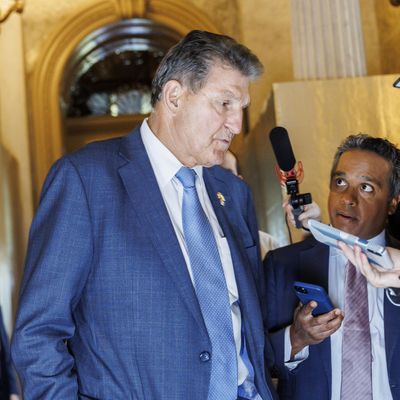
Virtually everybody in Washington, D.C., has reason to have mixed feelings about the 2022 midterm-election outcomes given the better-than-expected Democratic performance alongside the death of the Democratic trifecta. But for West Virginia Democratic senator Joe Manchin, the glass probably seems half-empty rather than half-full. Yes, with Democrats hanging on to the Senate, he gets to keep his chairmanship of the Energy and Natural Resources Committee, which is money back home. And he won’t be subject to punishment from a vengeful Senate Republican majority that blames him for brokering the Inflation Reduction Act instead of just killing off the entire Biden agenda. But the loss of the Democratic House cuts off the flow of legislation that required Democratic unanimity in the Senate, which gave enormous power to Manchin (and, to a lesser extent, Kyrsten Sinema).
In other words, Manchin is no longer the “King of America.” There won’t be any filibuster-skirting budget-reconciliation bills in the 118th Congress; if Speaker-to-be Kevin McCarthy even thought about one, he’d be defenestrated instantly. So the very source of Manchin’s extraordinary influence has been dammed up. There’s no longer much he can do for Chuck Schumer, or much Schumer can offer in return, to continue the West Virginian’s highly transactional relationship with the Democratic Party. And that, in turn, means he can’t tell the people he represents that they need him in Washington to shake down Democrats to their benefit.
And unfortunately, unless he just decides to retire (he is, after all, 75, which used to be a bit past retirement age), Manchin will soon be trying to explain to the heavily Republican people of his state why they still need him around. His second full term ends in 2024, and the first of what may be multiple Republican challengers, Representative Alex Mooney, has already announced his candidacy. Manchin won reelection in 2018, defeating Republican attorney general Patrick Morrisey by 3.3 percent. But he did not win a majority, and 2018 was famously a very good year for Democrats. 2024 will be a presidential year; Donald Trump won 68.5 percent of West Virginia’s vote in 2016 and managed to edge his vote up to 68.6 percent in 2020. There’s no reason to predict a Democratic renaissance in the state two years from now. Back in 2012, another presidential year, Manchin did run 25 points ahead of Barack Obama to win his first full term by a landslide. But that was a long time ago, and it’s unclear exactly what Manchin will offer his voters that a GOP successor could not do better and more consistently.
Manchin has some time to carve out a renewed legacy in the Senate before making up his mind about whether to stay or go in 2024. Much as he has frustrated them, Democrats are praying he’ll run again; they have zero chance to keep his seat with another candidate, and their landscape for keeping Senate control will be much tougher in 2024. There’s a lot for Manchin to think about in quiet moments on his houseboat during the holidays after a lame-duck session during which he may have a last hurrah as the King of America in a Democratic-controlled Congress.
More on the 2022 midterms
- J.D. Vance Explains His Conversion to MAGA
- Are Democrats the Party of Low-Turnout Elections Now?
- New Midterms Data Reveals Good News for Democrats in 2024






























